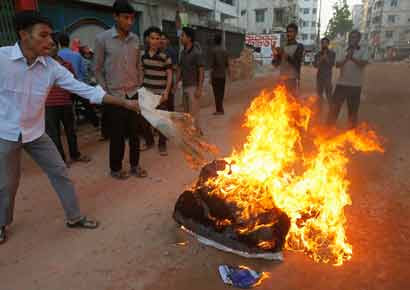 Relations between India and Bangladesh can at best be described as a roller coaster ride over the past 42 years. Professed mutual goodwill and a commitment to promote bilateral cooperation by both countries may have been declared at regular and frequent intervals, but it is an acknowledged fact, that there are many issues that still remain unresolved.
Relations between India and Bangladesh can at best be described as a roller coaster ride over the past 42 years. Professed mutual goodwill and a commitment to promote bilateral cooperation by both countries may have been declared at regular and frequent intervals, but it is an acknowledged fact, that there are many issues that still remain unresolved.
By and large India and Bangladesh have had a practical and working relationship with each other over the past four decades and more, but in 2014, India still continues to loom large in many ways in Bangladesh, in terms of its impact on the latter’s domestic politics and foreign policy.
Politically, the first half of the year 2014 has been a landmark one for both India and Bangladesh. Both countries held general elections, and an objective assessment suggests they were profoundly different to each other.
If elections in India were a celebration of democracy in its truest sense in the 21st century, with every political party and leader using every possible medium available on the information and technological highway to woo more than half-a-billion eligible voters to vote for their cause and policies, in Bangladesh, it was predictably a one-sided pre-determined electoral gift for the incumbent Awami League, with the opposition BNP opting to stay away from the campaign on grounds of perceived political injustice.
In India, even before leading the BJP and its allies to an unprecedented majority win, prime ministerial candidate Narendra Modi used his campaign to highlight his deep concern over Bangladesh’s alleged soft approach towards stopping the persecution of religious minorities, especially Hindus, and its failure to curb unabated illegal immigration into India.
It may be recalled that in April, at a rally in West Bengal’s Serampore area, Modi asked ‘Bangladeshi immigrants’ to be prepared to leave India after May 16. It is well known, that illegal immigration from Bangladesh has changed the demographic and political profile of neighbouring Indian states of West Bengal, Assam and Tripura.
Assam has a 34% Muslim population as per the 2011 census, up from 23% in 1971. It has been observed that the Awami League Government, led by Sheikh Hasina, has shown little inclination to arrest the influx.
MJ Akbar, spokesperson for the BJP, avers, “Look, the point is they are illegal immigrants. The catch word is ‘illegal’. This government has not been elected to power to allow illegal immigrants in the country, and we will take necessary action to stop the influx.”
Since returning to power for a second consecutive term in January this year, the Awami League Government has displayed little conviction in protecting the interests of Hindus, who constitute eight per cent of that country’s population.
The recent attacks on Hindu villagers in Comilla District, about 100 kilometers south east of Dhaka, is one of the many incidents of harassment faced by the community. Reports of incidents of Islamists vandalising Hindu temples and idols are common. There are alleged reports of Islamists having become a law unto themselves, and it is being felt, that the Awami League needs to do much more to instil confidence in the Hindu minorities.
Islamic fundamentalists like the Jamaat-e-Islami, are not the only ones at fault. In many provinces, opportunistic Awami League leaders have been allegedly accused of using divisive communal sentiments to enrich themselves.
Akbar says, “If this attack has happened, and it is true that it has happened, it is deeply reprehensible.”
Vinod Bansal, President of the Delhi unit of the VHP, said, “Bangladesh started off as secular nation, and it was only later that their various administrations adopted methods of religious persecution of minority Hindus. If there are reports of religious persecution of minorities, the new Indian government must get in touch with its counterpart in Bangladesh and ensure that it is stopped forthwith.”
“We in India should be ready to counter any threat of persecution. We should approach human rights bodies, and other such bodies, and bring to their notice the (alleged) maltreatment of Hindus. The Bangladesh Government should be aggressive, and not soft on fundamentalists. The VHP is always ready to guarantee the safety and security of all minority Hindus in other countries,” he added.
In Bangladesh, some unpleasant incidents have taken place and been reported about in the last four months, suggesting that there has been no attempt by the AL administration to take extraordinary steps to regain people’s confidence. Is it a case of the proverbial old wine in a new bottle?
The Bangladesh Chhatra League, the Awami League’s student wing, has been alleged accused of mindlessly killing at least 10 people; including a Hindu tailor Biswajit Das, which has shocked the public conscience.
Praveen Togadia, International Working President of the Vishva Hindu Parishad, said, “I am confident the new (Modi-led) government will fulfill its promises given in the BJP’s election manifesto. The time for strategies, policies and effective implementation of the same will come once the government settles down. I am sure the issue of persecution of Hindus and issues related to border safety as far as Bangladesh is concerned will be dealt with appropriately.”
In its annual world report, Human Rights Watch observed that human rights in Bangladesh had worsened in 2013, and continues to suffer as the government cracked down on members of civil society, the media, the political opposition and the Hindu minority.
“It has been tragic for Bangladesh, with political unrest leading to unnecessary deaths of protesters, security personnel, and bystanders,” said Brad Adams, HRW’s Asia Director.





